Difference between AWS and Azure
Category: AWS Posted:Mar 04, 2019 By: Alvera Anto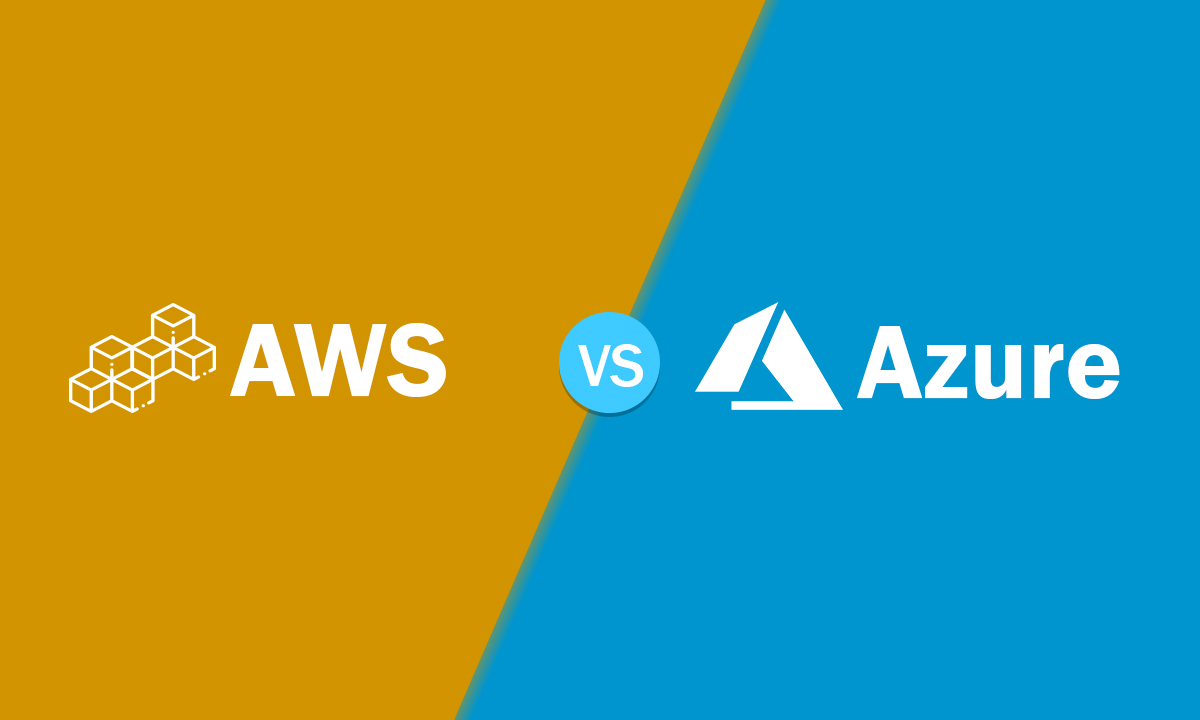
Data storage is essential for every business organization. Previously, conventional storage solutions were used to rule the technological world where physical storage devices were used to store data. But, in this digital age, organizations are more cautious about the safety and security of keeping their essential information in one place. With the beginning of technological revolutions, organizations have now shifted from traditional storage devices towards a more enhanced and effective cloud storage solutions. Now, the companies do not have to worry about misplacing their critical data because cloud storage platform helps to keep their important business data safe. Cloud has transformed the way in which organizations manage their crucial data. The data stored on cloud-based storage servers are accessed with the help of internet. The businesses which offer the network services and infrastructure for the cloud are called cloud service providers (CSPs). Amazon and Microsoft are the two major cloud service providers. This article presents a difference between the Amazon Web Services and Microsoft Azure.
Want to know More about AWS Solution Architect Training? Click here
AWS: Amazon has offered a cloud service platform, i.e., AWS. It delivers services in various domains like computing, storage, delivery and other functionality that support businesses to enhance and scale. These domains are used in the form of services, which can be utilized to develop and organize numerous applications in the cloud platform. These services are created to work with each other to produce a scalable and effective result.
AWS services are classified into three types such as Infrastructure as a Service (IaaS), Software as a Service (SaaS) and platform as a service (PaaS). AWS was introduced in 2006 and become the best cloud platforms among the other cloud platforms. Cloud platform offers different benefits, for example, cost minimization, and reduction of management overhead, etc.
Microsoft Azure: It is a cloud service platform provided by Microsoft, which deliver services in various domains, like compute, storage, networking, database and other functionality which supports businesses to enhance and scale. Azure services are classified as the platform as a service (PaaS), software as a service (SaaS) and Infrastructure as a Service (IaaS). Developers and software employees utilize these services to create, manage and organize services and applications through the cloud. Microsoft Azure was introduced in 2010. It is evolving as one of the leading commercial cloud service providers. It provides an extensive range of integrated cloud services and functionalities like analytics, computing, networking, database, storage, web application, etc. which can be combined with your environment flawlessly to attain proficiency and scalability.
Difference between AWS and Azure:
AWS and Azure are the major cloud platform picked up by most of the organizations. But they differ from each other. Let’s discuss some significant differences between them
1. It is possible for the AWS EC2 users to configure their VMS and pre-configured images, but Azure users have to select the virtual hard disk to build a VM which is pre-configured by the third party, and also they have to specify the number of cores and required memory.
2. AWS provides a temporary storage, which will be allocated when an instance is begun and demolish when it is completed and S3 for object storage. However, Azure provides temporary storage by block storage via page Blobs for VM’s and Block Blobs for object storage.
3. AWS provides VPC, i.e., Virtual private cloud which helps the user to create separated networks inside the cloud, whereas Azure provides Virtual network, which can be utilized to build isolated networks, subnets, route tables, private IP address range similar to AWS.
4. AWS is less open to private or third-party cloud providers, but Azure is open to Hybrid cloud systems.
5. AWS follows pay as you go and charge per hour, Azure also supports the same model, but they charge per minute, which gives more accurate pricing model as compare to AWS.
6. There are more features and configurations in AWS also it provides more flexibility, power, and customization with support for numerous third party tools integration. On the other hand, Azure will be easy to use if users are aware of windows because it is a windows platform and on-premises windows servers can be easily integrated with cloud instances to build a hybrid environment.
Now, let’s compare Azure and AWS on the basis of various services.
1. Compute: In AWS, computers are used to carry out the calculation, processing, and computing data. As per the user’s requirements, thousands of processing nodes can be scaled using cloud service providers. AWS uses Elastic Compute Cloud (EC2) as a primary solution for scalable computing and for managing software container with Docker or Kubernetes it uses ECS and EC2 container registry.
Azure utilizes virtual machines for computing and to scale for large extent it uses virtual machine scale sets. It uses Container Service for software management, in Docker container and Container registry for Docker container registry.
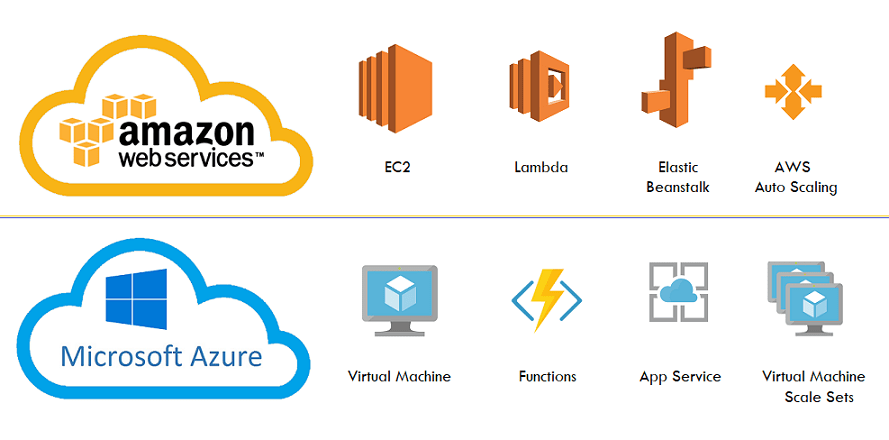
2. Networking: Cloud providers deliver various partners and networks which will interconnect with data centers using multiple products.
AWS utilizes VPC for networking and for cross-premises connectivity it uses the API. ELB, i.e., Elastic load balancing is used for load balance during networking. In Azure, a virtual network is used for networking or content delivery and for cross-premises connectivity it uses VPN gateway. It uses a load balancer and application gateway for load balancing during content delivery.
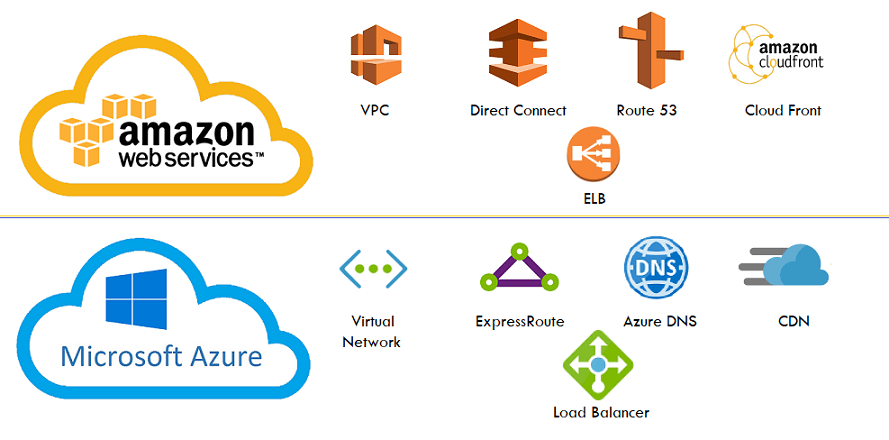
3. Storage: AWS utilizes Simple Storage Service, i.e. S3 which is the longest running than Azure and it offers various documents and tutorials. Also, it provides Archive storage by a Glacier, data archive and S3 infrequent access.For storage purpose, Azure uses Storage block blob which includes blocks and uploads huge blobs effectively. For archiving data, it utilizes storage cool and storage achieve.
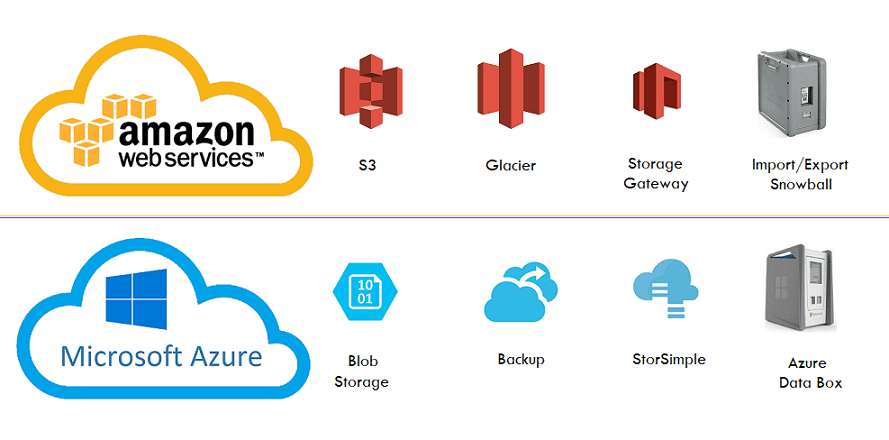
4. Database: All cloud providers offer the capability to implement a database in both SQL and NoSQL solutions. AWS utilizes a relational database as a service with the help of RDS. It uses NoSQL for Dynamo DB and caching for Elastic Cache. For relational databases, Azure makes use of SQL database, MySQL, and PostgreSQL. Also, it utilizes Cosmos DB for NoSQL solutions and Redis Cache for caching.
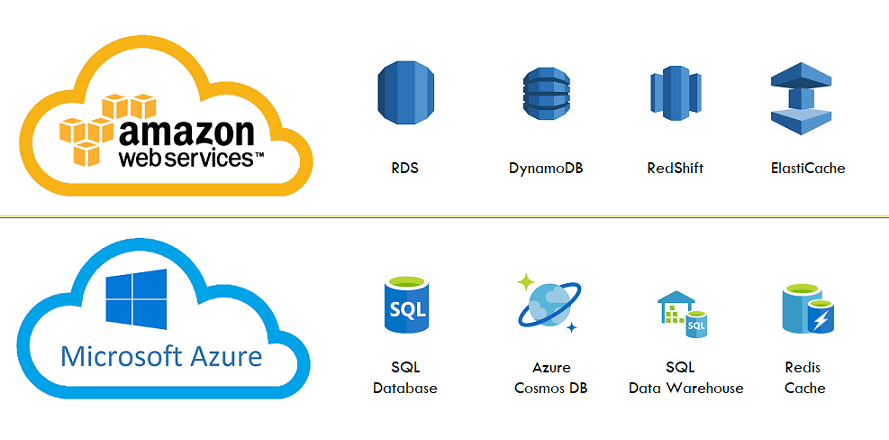
5. Deploying Apps: There is one benefit of a cloud service provider, i.e., it is easy to deploy an application. The developers have to deploy their apps on various servers virtually by using PaaS features.
Azure has several app deployment tools which can be used to deploy apps on different servers. These tools are container service, functions, batch, cloud services, etc. AWS provides related solutions with Elastic Beanstalk, Batch, Lambda, container service, etc. But it does not have various features on app hosting.
6. Open Source Developers: AWS is a good option for open source developers because it allows Linux users and provides various integrations choices for various open source applications. Azure offers the ability for enterprise users to use the current active directory account to sign on the Azure cloud platform and run the .net framework on Windows, Linux, etc.
Register here for a Live Webinar on AWS
Conclusion: With the above comparison and differences, it is found that both cloud platforms, i.e. AWS and Azure have strong capabilities and it is hard to select any one of them. AWS is more flexible and provides extra features, but when it comes to Hybrid cloud and integration with Microsoft stack, Azure is an excellent choice. Therefore, organizations can choose any of the cloud platforms, according to their requirements.



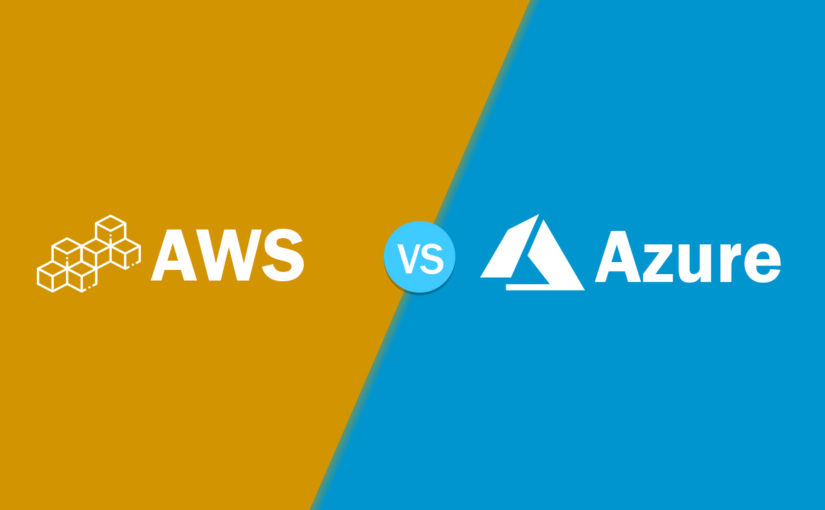
 99999999 (Toll Free)
99999999 (Toll Free)  +91 9999999
+91 9999999